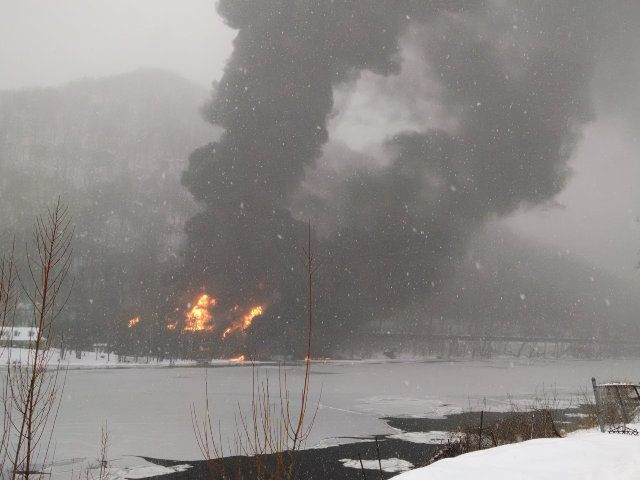Another 100-plus tanker oil train carrying crude from North Dakota’s Bakken Field derailed Tuesday morning, causing an explosive fire near the West Virginia state capital of Charleston. Local residents were forced to flee their homes in frigid weather as firefighters battled the blaze.
Officials warned that the oil spill may contaminate local drinking water. With the U.S. oil boom accelerating and the Keystone XL Pipeline politically delayed, railroads are making fortunes shipping crude thousands of miles to California and the East Coast.
In the latest updated report from safety officials on the scene, at least 27 CSX Corporation oil-tankers derailed and 19 were burning. The crash was the second in 10 months involving a CSX train transporting North Dakota oil to a refinery in Virginia.
The rural nature of the crash site may limit the damage from the derailment. But with power lines damaged from a horrific ice storm buffeting the area, firefighters were having difficulty pumping enough water to douse the flames.
The accident happened adjacent to a stream that feeds Charleston’s municipal water intake on the Kanawha River. Terrance Lively, a spokesman for the West Virginia Department of Military Affairs and Public Safety, said that ice dams from the severe winter storm may have prevented significant amounts of crude oil from reaching a local water system.
Governor Earl Ray Tomblin declared a state of emergency covering Kanawha and Fayette counties. About 85 people were taken to local shelters, according to Lively.
As Breitbart reported in December, railroads are making fortunes carrying North Dakota crude oil from the Bakken field at an average cost of $19 a barrel to the East Coast and $17 a barrel to California. With the U.S. oil boom overwhelming America’s ability to move crude oil by the nation’s existing pipeline system, and the Obama Administration continuing to oppose the building of the Keystone XL pipeline, the rail cost has almost doubled.
The distribution bottleneck allows railroads to load at least ten oil-trains a day, averaging 100 tankers each, carrying 3.35 million gallons of crude oil headed thousands of miles to East Coast and West Coast refineries.
Fracking of underground shale formations in the Bakken and other regions has allowed U.S. domestic oil production to reach a 40-year record of 9.2 million barrels a day last month. Production has increasing at another 100,000 barrels a day each month.
Six years ago, trains seldom pulled tank cars loaded with crude oil. Most railroads loaded their DOT-111 tankers with cargoes of non-explosive products like corn syrup sweeteners and industrial chemicals. Of the roughly 92,000 U.S. rail tankers being used today to haul crude oil and other flammable liquids, only 14,000 have been updated with modern safety features. Modifying the 78,000 DOT-111 rail tankers to meet higher flammability standards could cost railroads $5.2 billion, according to Bloomberg.
Breitbart reported in April of last year that CSX tankers involved in an oil-train derailment in Lynchburg, Virginia, were older DOT-111s. About 15 tankers came off the track resulting in a fire that a led to dramatic video of flames and billowing smoke against the backdrop of the downtown of the 78,000-strong city.
The 107 CSX tankers involved in today’s Charleston accident appear to be the updated Association of American Railroads CPC (Casualty Prevention Circular)-1232 (CN-1232). The post-2011 standards require head shields, top-fitting rollover protection, half-inch-thick normalized tank steel, double-shelf couplers, and bottom skid protection.
As Breitbart News revealed last April in “California: Here Come the Oil Trains,” the U.S. government refuses to disclose the number of hundred tank-car trains that rumble into California and other states carrying highly combustible crude oil each day. Despite growing public concerns that crude oil carried by tank cars is susceptible to puncture, the Office of Emergency Services announced on June 14, 2014, the State of California would continue withholding disclosing the volumes and time schedules of oil-trains.
The Charleston derailment is the second oil-train crash in North America in the last four days. The Canadian National Railway Co. had to shut down its main line linking western and eastern Canada after a 100 plus car oil-train derailed and 7 tankers caught fire in Ontario on Saturday.
If you are interested in trains, please click on: Cal High-Speed Rail Confiscating Farms for Development Rights.

COMMENTS
Please let us know if you're having issues with commenting.